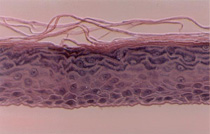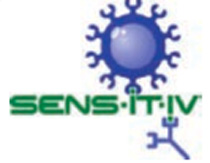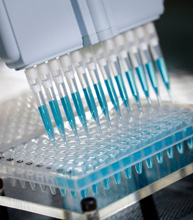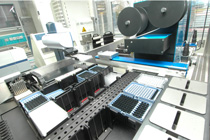
Europe adopts new law on animal experiments |
 On 8 September, the European Parliament voted to adopt a new law replacing the nearly 25-year-old Directive 86/609/EEC, which regulates the use of more than 12 million animals in European laboratories each year.
On 8 September, the European Parliament voted to adopt a new law replacing the nearly 25-year-old Directive 86/609/EEC, which regulates the use of more than 12 million animals in European laboratories each year. |
The new Directive 2010/63/EU introduces a number of substantial improvements, including:
|
Cross-sector review, workshop call for changes to acute testing requirements | |
 On 16 September, the European Partnership for Alternative Approaches to Animal Testing (EPAA) convened a cross-sector workshop in Brussels to examine the findings of its task force regarding opportunities for application of the 3Rs in the area of acute systemic toxicity testing. Workshop participants included chemical and pesticide regulators from across EU member states and Japan, Commission services, regulated industry and CROs, and animal welfare NGOs. Key recommendations of the task force, published by Seidle et al in Toxicological Sciences, include the following:
On 16 September, the European Partnership for Alternative Approaches to Animal Testing (EPAA) convened a cross-sector workshop in Brussels to examine the findings of its task force regarding opportunities for application of the 3Rs in the area of acute systemic toxicity testing. Workshop participants included chemical and pesticide regulators from across EU member states and Japan, Commission services, regulated industry and CROs, and animal welfare NGOs. Key recommendations of the task force, published by Seidle et al in Toxicological Sciences, include the following:
| |
In vitro skin irritation, other 3Rs guidelines adopted by OECD | |
 2010 has been another productive year for the Organisation for Economic Co-operation and Development (OECD) test guidelines programme, with multiple EU-pioneered and ECVAM-endorsed 3Rs methods achieving formal international acceptance as OECD guidelines and guidance documents. These include:
2010 has been another productive year for the Organisation for Economic Co-operation and Development (OECD) test guidelines programme, with multiple EU-pioneered and ECVAM-endorsed 3Rs methods achieving formal international acceptance as OECD guidelines and guidance documents. These include:
| |
EU research corner | ||
| ||
| ecopa is dissemination partner in the EU 6th and 7th Framework Programme projects carcinoGENOMICS, ESNATS and Sens-it-iv. Brief updates from these projects are provided below, and comprehensive 2010 progress reports will be available by 30 November at AXLR8.eu. | ||
 The carcinoGENOMICS project board met in Copenhagen, Denmark on 9-10 September to identify next steps to be completed leading up to the end of the project in 2011. As mentioned in previous ecopa messenger, the workshop May workshop 'Testing first project results on the target audience: regulators' was a success in terms of advice and feedback provided to project partners by regulatory participants. The next annual consortium meeting will take place in Arona, Italy from 8-10 November. There are considerations to plan for an additional dissemination workshop in UK in early 2011 in conjunction with the annual congress of the Netherlands or British Toxicology Society.
The carcinoGENOMICS project board met in Copenhagen, Denmark on 9-10 September to identify next steps to be completed leading up to the end of the project in 2011. As mentioned in previous ecopa messenger, the workshop May workshop 'Testing first project results on the target audience: regulators' was a success in terms of advice and feedback provided to project partners by regulatory participants. The next annual consortium meeting will take place in Arona, Italy from 8-10 November. There are considerations to plan for an additional dissemination workshop in UK in early 2011 in conjunction with the annual congress of the Netherlands or British Toxicology Society. | ||
 The Embryonic Stem cell-based Novel Alternative Testing Strategies (ESNATS) project held its general consortium meeting on 26-28 April at the Joint Research Centre in Ispra, Italy. The progress of sub-projects in the areas of reproductive toxicity, neurotoxicity, ESC-based toxicogenomics and toxicoproteomics signatures, and toxicokinetics, metabolism and modelling was presented, and detailed discussions followed regarding the ESNATS database, testing strategy, current status of cell systems, culturing and quality control issues, and protocol scale-up/automation. The second annual ESNATS "summer school" was held in Tallinn, Estonia from 19-23 September 2010. The next ESNATS workshop is planned for March 2011.
The Embryonic Stem cell-based Novel Alternative Testing Strategies (ESNATS) project held its general consortium meeting on 26-28 April at the Joint Research Centre in Ispra, Italy. The progress of sub-projects in the areas of reproductive toxicity, neurotoxicity, ESC-based toxicogenomics and toxicoproteomics signatures, and toxicokinetics, metabolism and modelling was presented, and detailed discussions followed regarding the ESNATS database, testing strategy, current status of cell systems, culturing and quality control issues, and protocol scale-up/automation. The second annual ESNATS "summer school" was held in Tallinn, Estonia from 19-23 September 2010. The next ESNATS workshop is planned for March 2011. | ||
 The Sens-it-iv consortium is hosting a congress marking the official closure of this EU funded project on 24-25 November 24-25 at the Crowne Plaza Brussels Airport Hotel. The objective is to actively stimulate the transfer and implementation of knowledge acquired and tools developed by the consortium in the areas of skin and respiratory sensitisation through discussion and a market place of innovation. Topics to be covered include (i) novel opportunities for test development (Scientific Spin-offs), (ii) promising immature tests, (iii) the Sens-it-iv tool box, (iv) mechanisms of action, (v) impact of the Sens-it-iv progress on current allergy testing and regulation, and (vi) gaps and future perspectives. Programme and registration details will be posted at Sens-it-iv.
The Sens-it-iv consortium is hosting a congress marking the official closure of this EU funded project on 24-25 November 24-25 at the Crowne Plaza Brussels Airport Hotel. The objective is to actively stimulate the transfer and implementation of knowledge acquired and tools developed by the consortium in the areas of skin and respiratory sensitisation through discussion and a market place of innovation. Topics to be covered include (i) novel opportunities for test development (Scientific Spin-offs), (ii) promising immature tests, (iii) the Sens-it-iv tool box, (iv) mechanisms of action, (v) impact of the Sens-it-iv progress on current allergy testing and regulation, and (vi) gaps and future perspectives. Programme and registration details will be posted at Sens-it-iv. | ||
Policy corner | |
|
2008 EU statistics on animal use in scientific procedures
Read more > European Parliament adopts more than 60 3Rs amendments to biocides regulation in first reading plenary vote Read more > ECHA practical guide on 'How to avoid unnecessary testing on animals' Read more > Presentations from ECHA workshop on 'non-test' strategies and uncertainty Read more > ECVAM 2010 report on 3Rs methods for cosmetics testing Read more > SANCO scientific committees charged with 'addressing the new challenges for risk assessment' Read more > International conference on animal welfare education Read more > | |
Thank You to our Sponsors! | ||||||||||
|---|---|---|---|---|---|---|---|---|---|---|
| ||||||||||
european consensus platform for alternatives Av. Paul Deschanel 36-38 B-1030 Brussels Belgium info@ecopa.eu |
||||||||||
 | ||
> ecopa.eu | ||
| > coming events | ||
| > subscribe | ||
 | ||
won't you join us? | ||
ecopa Annual General Assembly & IPAM / ecopa Workshop 'Toxicity Testing in the 21st Century & Alternative Methods' 26-27 November 2010 Milan, IT Programme > Register > Hotel reservation > CAAT-EU / ecopa Workshop 'Implementation of the New Directive 2010/63/EU on the Protection of Animals Used for Scientific Purposes' 31 January – 2 February 2011 Berlin, DE Details coming soon to ecopa.eu | ||
other coming events | ||
IVTS Annual Meeting 'REACHing Regulatory Requirements In Vitro' 2-3 November Liverpool, UK Read more > NC3Rs Workshop on Cell Transformation Assays 9 November London, UK Read more > CEFIC LRI 12th Annual Workshop 'Reduction of Uncertainty Enabling Decision Making' 17-18 November 2010 Brussels, BE Read more > EPAA Annual Conference 'The Unveiled Potential of Reduction and Refinement Strategies' 30 November Brussels, BE Read more > | ||
ESTIV Questionnaire for Young Scientists | ||
The European Society for Toxicology In Vitro has prepared a questionnaire aimed at students and young scientists active in the field of in vitro toxicology with the goals of attracting more student members and identifying needs and gaps to be covered in future ESTIV workshops. From all completed questionnaires received from existing and newly registered student members, one will be drawn blindly and will be rewarded with free participation in the ESTIV conference 2012. Deadline for completion: 31 December 2010. | ||
 | ||
National consensus platforms throughout Europe | ||
Austria Belgium Czech Republic Denmark Finland France Germany Hungary Ireland Italy The Netherlands Norway Poland Spain Sweden Switzerland | ||
 | ||




